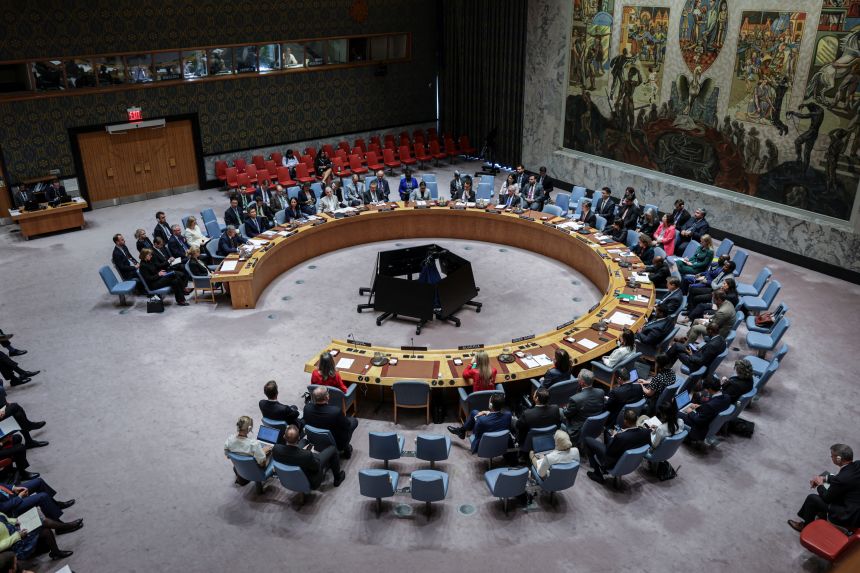
Iran’s nuclear program prompted the United Nations to reimpose sanctions on the country early Sunday, further tightening the grip on the Islamic Republic as its citizens worry about their futures and are increasingly priced out of the food they need to exist.
The sanctions went into effect on Sunday at 0000 GMT (8 p.m. Eastern) following the failure of last-minute diplomacy at the U.N.
Among other things, the sanctions will once more freeze Iranian assets overseas, stop military sales to Tehran, and penalize any advancements in Iran’s ballistic missile program. The “snapback” mechanism, which was part of Iran’s 2015 nuclear agreement with international powers, was used, and it came when Iran’s economy was already in ruins.
The record low value of the Iranian rial puts further pressure on food prices and makes day-to-day living even more difficult. This covers rice, meat, and other dining table essentials in Iran.
In the meantime, missile sites hit during the 12-day conflict in June now seem to be being rebuilt, raising concerns about a fresh round of fighting between Iran and Israel and possibly the United States.
In the Islamic Republic, which has reportedly executed more individuals this year than in the previous three decades, activists fear a growing wave of repression.
The nation has never encountered such a difficult period, even during the hardships of the 1980s Iran-Iraq war and the subsequent decades of sanctions, according to Sina, the father of a 12-year-old child who spoke on the condition that only his first name be used out of concern for potential consequences.
Sina told The Associated Press, “We’ve been dealing with economic hardship for as long as I can remember, and it gets worse every year.” “It’s always too late or too early for my generation—our dreams are vanishing.”
Since china and Russia had already advocated additional measures against Tehran, Snapback was intended to be veto-proof at the U.N. Security Council, meaning they could not stop it alone. On Saturday, Russian Foreign Minister Sergey Lavrov referred to them as an Iranian “trap.”
Thirty days ago, France, Germany, and the United Kingdom sparked a backlash against Iran for further limiting nuclear program monitoring and the impasse over its discussions with the United States.
Following Israel’s June assault on Iran, during which the United States hit nuclear sites in the Islamic Republic, Iran further withdrew from the International Atomic Energy Agency’s monitoring program. If Tehran decides to move quickly toward weaponization, the nation still has uranium enriched up to 60% purity in stockpiles, which is essentially enough to produce several atomic bombs. This is a short, technical step away from weapons-grade levels of 90%.
Although the West and IAEA claim Tehran had a structured weapons program until 2003, Iran has long maintained that its nuclear program is peaceful.
The United States’ unilateral withdrawal from the agreement in 2018, during the first term of President Donald Trump‘s administration, has been cited by Tehran as part of its argument that the three European countries shouldn’t be permitted to execute snapback.
Kelsey Davenport, a nuclear specialist at the Washington-based Arms Control Association, stated that the Trump administration seems to believe it has a stronger hand after the strikes and can wait for Iran to return to the table. “That’s a really risky assumption, considering the information Iran possesses and the materials that are still in Iran.”
“In the short term, kicking out the IAEA increases the risk of miscalculation,” she continued, adding that Iran still faces risks. The absence of inspections might serve as a pretext for more strikes by the US or Israel.
According to the state-run IRNA news agency, Iran called back its ambassadors to France, Germany, and the United Kingdom on Saturday for talks before the sanctions were reinstated.
U.S. Secretary of State Marco Rubio praised the three European nations for “an act of decisive global leadership” for imposing the sanctions on Iran.
“President Trump has been clear that diplomacy is still an option — a deal remains the best outcome for the Iranian people and the world,” Rubio said in a statement. “Iran must agree to direct negotiations for that to occur.”
In Iran, hunger and anxiety are on the rise.
Food prices in Iran increased after the June war, making even the most costly meat unaffordable for lower-income families.
According to Iran’s Statistical Center, the price of basic food items increased by more than 50% during the same period, and the government estimated overall annual inflation to be 34.5% in June. Even so, it doesn’t accurately represent what customers see in stores. In a year, the price of butter almost doubled, and that of pinto beans tripled. The staple grain of rice increased by almost 80% on average, reaching 100% for premium types. Beer and lamb are up 9%, and whole chicken is up 26%.
“I see new, higher prices for cheese, milk, and butter every day,” Sima Taghavi, a mother of two, said at a grocery store in Tehran. “My children are too young to be deprived, so I can’t leave them off my grocery list like fruits and meat.” According to Iranian local media, since June, more patients have been visiting psychiatrists due to dietary pressure and concerns about the war’s return.
In a July interview, Dr. Sima Ferdowsi, a clinical psychologist and professor at Shahid Beheshti University, told the Hamshahri newspaper, “The psychological pressure from the 12-day war on the one hand, and runaway inflation and price hikes on the other, have left society exhausted and unmotivated.”
“If the economic situation continues like this, it will have serious social and moral consequences,” she warned, with the newspaper noting “people may do things they would never think of doing in normal circumstances to survive.”
For breaking news and live news updates, like us on Facebook or follow us on Twitter and Instagram. Read more on Latest World on thefoxdaily.com.





COMMENTS 0